الأسواق
عند تصميم تدخل إنساني وتحديد ما إذا كان سيتم استخدام المساعدات النقدية والقسائم، يجب أن يكون تحليل السوق جزءًا من تحليل الاستجابة الشامل. وثبت أن دعم الأسواق للعمل بشكل جيد يؤدي إلى تعافي أسرع وزيادة المرونة في المناطق المتضررة من الكوارث.
واستثمرت العديد من المنظمات في تطوير أدوات لدعم تحليل السوق وتفكر في البرمجة القائمة على السوق بشكل أكثر شمولية. يشمل ذلك التدخلات التي تستخدم السوق (مثل التحويلات النقدية إلى السكان المتضررين)، بالإضافة إلى التدخلات التي تدعم الأسواق بشكل مباشر (مثل المنح المشروطة للمتداولين لإعادة تشغيل أسواقهم).
Related initiatives
Featured content

Introduction to Market Analysis
دورة تدريبية
This 30 minute online course provides an introduction to the analysis of markets in emergency contexts, with input from some of the world’s leading thinkers on the topic.

A Practical Guide to Market Analysis in Humanitarian response
دورة تدريبية
A three to four hour online course designed to provide future humanitarian market assessment team members with a solid understanding of theory and steps of market assessments so that they can join assessment teams prepared with a basic understanding of what they will be doing and why.
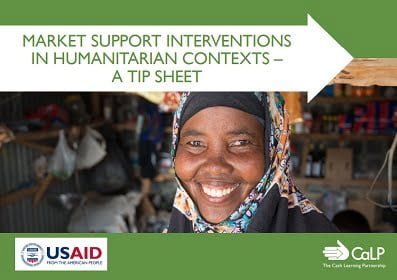
Market Support Interventions in Humanitarian Contexts – a Tip Sheet
Guidelines and Tools
This tip sheet defines what market support programming in humanitarian contexts is, and what it can look like in practice. It enables humanitarian practitioners to systematically consider market support interventions alongside other programme activities. The scope includes support interventions focusing on supply/availability and on demand/access. The tip sheet is based on secondary data...
Latest
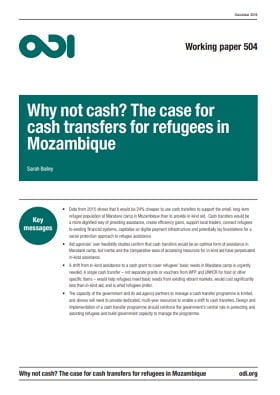
Why not cash? The case for cash transfers for refugees in Mozambique
Report
There are two areas where cash transfers could play a role in humanitarian assistance in Mozambique: in response to natural disasters and in support of the long-term refugee population. This working paper focuses on refugees. Why not cash? The case for cash transfers for refugees in Mozambique is one of a...

Pre-Crisis Market Analysis: Credit, Drinking Water and Wheat Flour Market Systems
Report
Mosul, Iraq’s second largest city, was captured by ISIS in June 2014 and remains under their control. The Iraqi army has vowed to recapture Mosul and the speculation is that a counter-offensive is imminent – a military operation which could have dramatic humanitarian implications. A large influx of...
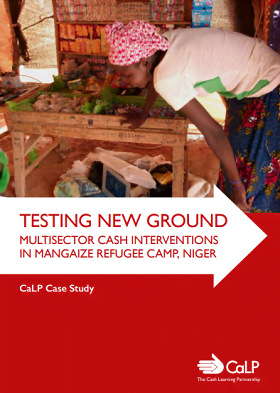
Testing new ground. Multisector cash interventions in Mangaize refugee camp Niger
Report
In the midst of the Mali refugee crisis in Niger, UNHCR implemented one of the first multisector cash transfer projects in Mangaize refugee camp in 2015, providing refugees with grants covering non-food items, hygiene, shelter and livelihood needs. The cash project came on the heels of a successful food...

Scale Right: Coordinating Improved Cash Assistance in Greece
Report
Europe is still reeling from the largest refugee crisis it has experienced since World War II. During the first half of 2015 Greece saw an average of 3,000 refugees arriving daily by sea onto the island of Lesvos. While the number of new arrivals—fleeing war in Syria, conflicts in Iraq, Afghanistan and...

Scaling Up Humanitarian Cash Transfers in Nepal
Case Study
The Nepal earthquake has a number of lessons for the global debates on scaling up cash both at the level of cash responses themselves and in the more transformational way envisaged by the High Level Panel through which cash can disrupt the established humanitarian system. Humanitarian cash transfers after...

Research: Refugees Can Bolster a Region’s Economy
Report
The world’s refugee population has increased sharply in recent years, leading governments to argue over which countries should take in people displaced by war or other calamities. At the core of this debate is cost: refugees are usually considered an economic burden for the countries that take...

Cash/Food. A Comparative analysis of the effectiveness of food assistance modalities in refugee settlements
Report
A comparative analysis of the effectiveness of food and cash assistance modalities for household food security in refugee settlements
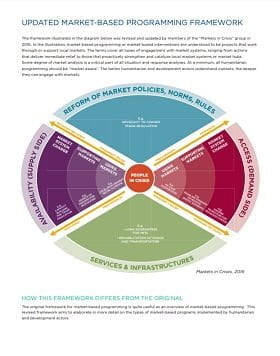
Updated Market-Based Programming Framework
Guidelines and Tools
The Market Based Programming framework was designed to help humanitarian actors understand market approaches in fragile contexts. Some degree of market analysis is a critical part of all situation and response analyses. At a minimum, all humanitarian programming should be “market aware”. The better...

Prepaid Card Products For Humanitarian Programs: Actors, Insights & Recommendations
Guidelines and Tools
Today, over 130 million people need humanitarian support to survive. Fortunately, new tools such as prepaid cards allow us to respond to these needs with increasing flexibility and efficiency. Today’s leading humanitarian agencies are increasing their use of prepaid cards in places like Jordan, the...

Literature review on the Use of Cash in Shelter
Report
The Global Shelter Cluster (GSC) with support from UNHCR conducted this literature review of the use of cash in shelter programming to help assess how much documented evidence was currently available from within the sector. The objective of this study is to help better prepare the GSC and its members to...

Baseline Assessment for Education Cash Transfer Programming for IDPS in Dahuk Governance
Report
REACH, in collaboration with UNICEF, conducted a Baseline Assessment of Access to Education among Internally Displaced Persons in the Dahuk Governorate of Iraq. This assessment aimed to improve the efficiency of humanitarian cash assistance by implementing partners for increased access to education in the...
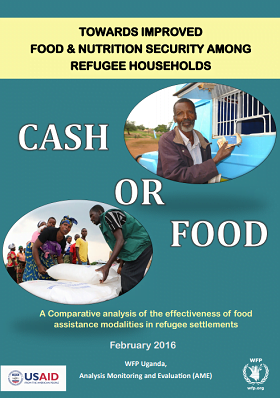
Cash or Food A Comparative analysis of the effectiveness of food assistance modalities in refugee settlements
Report
A comparative analysis on the effective of food and cash transfer modalities for household food security in refugee settlements in Uganda.

Afghanistan Emergency Response Mechanism (ERM)
Report
The Afghanistan Emergency Response Mechanism (ERM) was selected as a case study to illustrate the ‘alliance’ form of inter-agency collaboration for sector-focused cash assistance, with semi-formal relationships and separate funding flows between members. It is distinctive from other cases in that cash...
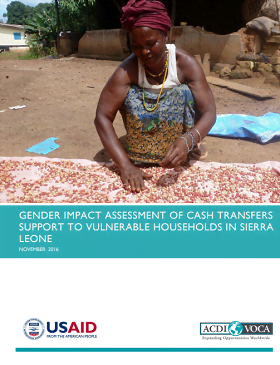
Gender impact assessment of cash transfers support to vulnerable households in Sierra Leone
Report
This report outlines the findings and recommendations from a qualitative assessment carried out to complement and further develop the findings from a recently concluded quantitative study of SNAP+ in order to better understand the driving factors behind behavior during the Ebola crises. The quantitative...
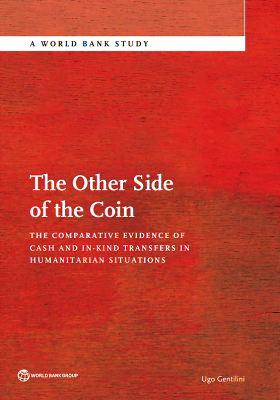
The Other Side of the Coin. The comparative evidence of Cash and in kind transfers in humanitarian situations
Report
This paper reviews the existing evidence on the performance of alternative transfer modalities across humanitarian sectors, including cash transfers, vouchers,and in-kind assistance (food and non-food). These were assessed in relation to food security, nutrition, livelihoods, health, education, and...
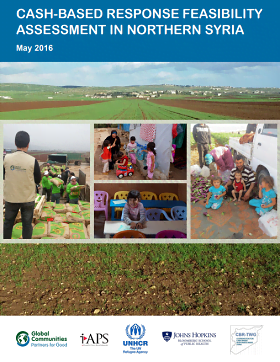
Cash-based Response Feasibility Assessment in Northern Syria
Case Study
As the conflict in Syria extends beyond the fourth year, there is need for a widespread humanitarian response focused on urban areas that addresses humanitarian needs and promotes resilience for the 13.5 million people in need of protection and humanitarian assistance within Syria. The majority of...
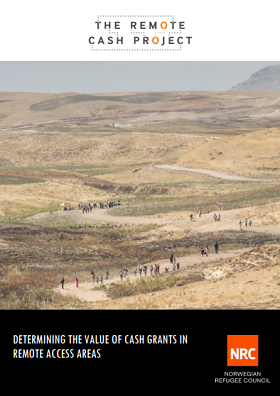
Determining the Value of Cash Grants in Remote Access Areas
Guidelines and Tools
This review aims to complement the work of NRC within the framework of the ECHO funded Remote Cash Project by providing a comparative analysis of different means of determining the size of cash grants, with the development of practical recommendations for approaches that can be used in hard to access...

Building on social protection systems for effective disaster response: the Philippines experience
Report
How can social protection systems be used in disasters, as a complement to, or substitute for, humanitarian assistance? Oxford Policy Management led a two-year research project investigating this question, looking at the role of social protection in both mitigating the impact of large-scale shocks and...

Labour Market Analysis in Humanitarian Contexts. A practitioner’s guide
Guidelines and Tools
The world and the scale of complex crises are rapidly changing, thus calling for new tools and fresh approaches. This guide aims to help humanitarians conduct better labour market analyses (LMA) to inform the design and delivery of livelihoods and market strengthening programmes in emergency crisis and...

Market Analysis and Outcome/Impact Measurement in Cash Transfer Programming in the WaSH and Shelter Sectors in Sudden Onset Disasters
Report
Over the past five years, cash transfer programming has become an increasingly popular modality of humanitarian intervention. Recently, unconditional and unrestricted MPGs have been increasingly championed as a default modality, based on evidence collected by organisations such as the...